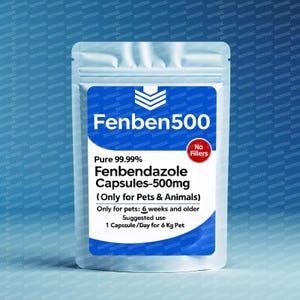All You Need to Understand About Fenbendazole and Its Utilizes in Pet Dog Care Solutions
Fenbendazole is a widely identified anthelmintic medicine in veterinary care. It efficiently targets various stomach bloodsuckers in animals. Understanding its mechanism and suitable applications is essential for pet proprietors. This medicine supplies remarkable benefits however likewise needs mindful dosage and tracking. As pet dog care advances, discovering fenbendazole's role can give understandings into maintaining excellent wellness for beloved pets. What should animal owners find out about its management and security?
What Is Fenbendazole?
Fenbendazole is an anthelmintic medication mainly used to deal with parasitical infections in animals. This broad-spectrum dewormer is reliable versus a selection of stomach bloodsuckers, consisting of roundworms, hookworms, whipworms, and particular kinds of tapeworms. It is generally used in canines, pet cats, horses, and livestock, making it a versatile option for family pet proprietors and vets alike. Fenbendazole is generally provided by mouth, offered in numerous solutions such as granules, tablets, or suspensions. The medicine is normally considered secure, with a low incidence of adverse effects, although it is important for family pet owners to comply with dosage instructions very carefully. By removing parasitic infections, fenbendazole aids preserve general health and wellness and well-being in animals, guaranteeing they remain energetic and vivid. Its effectiveness and safety account have actually added to its prevalent usage in vet method, establishing fenbendazole as a keystone in pet dog care solutions.

Exactly How Does Fenbendazole Work?
Targeting parasites at a cellular level, fenbendazole interrupts their metabolic processes. This anthelmintic medication mainly hinders the function of microtubules, crucial elements of the parasite's mobile framework. By binding to tubulin, a protein that develops microtubules, fenbendazole protects against the setting up of these structures, which are necessary for numerous mobile features, including transport and division. As an outcome, the impacted parasites are not able to maintain their life processes, bring about their ultimate death.
Fenbendazole likewise interferes with power production in bloodsuckers by inhibiting the enzyme fumarate reductase, essential for their metabolic process. This double activity not only hampers their ability to duplicate but additionally endangers their power supply, more enhancing its effectiveness. Generally, fenbendazole's targeted mechanism enables effective control of a broad range of parasitical infections, making it a beneficial tool in vet medication for the treatment of ravaged animals.
Typical Usages of Fenbendazole in Pet Dog Treatment
In the domain name of vet medication, fenbendazole is typically used for its efficiency against a variety of parasitic infections in family pets. This broad-spectrum anthelmintic is primarily made use of to deal with gastrointestinal parasites such as roundworms, hookworms, whipworms, and tapeworms. Fenbendazole is also efficient against specific protozoan infections, including giardiasis.
Veterinarians usually recommend fenbendazole for routine deworming in young puppies and kittens, given their sensitivity to these bloodsuckers. In addition, it is used in adult canines and pet cats as component of a thorough bloodsucker control program.
Fenbendazole is preferred for its safety and security account, making it ideal for usage in numerous breeds and ages of pet dogs. It is typically provided in dental kind, via granules or tablets, enabling very easy incorporation into a family pet's diet regimen. Regular usage of fenbendazole contributes to keeping overall wellness and well-being in pets by avoiding and taking care of parasitical infections effectively.
Benefits of Fenbendazole for Pet dogs
Fenbendazole offers significant advantages for pet dogs, particularly as an effective treatment for different parasitic infections. Its safety and security account makes it suitable for an array of pets, making certain that both pet dogs and felines can gain from its use without considerable danger. This combination of efficacy and safety and security settings fenbendazole as a useful choice in pet dog care.
Efficient Bloodsucker Treatment
Various pet dog owners seek reliable remedies for bloodsucker invasions, and fenbendazole has become a reliable alternative. This broad-spectrum anthelmintic medication targets numerous inner parasites, including roundworms, hookworms, and whipworms. Fenbendazole interferes with the basal metabolism of these parasites, leading to their removal from the family pet's system. Its effectiveness is significant across various types, making it a versatile option for several pet dog proprietors - 222 mg. Additionally, fenbendazole is frequently well-tolerated, with marginal negative effects reported, which boosts its allure as a treatment alternative. Routine usage of fenbendazole can assist preserve a family pet's wellness and convenience by protecting against the difficulties connected with parasitic infections. Generally, fenbendazole stands apart as a beneficial tool in the battle against usual bloodsuckers in family pets
Safe for Various Pets

Dosage and Management Standards
When thinking about fenbendazole for pet dogs, understanding the proper dosage is crucial for performance and security. Recommended dose guidelines vary based upon the kind of pet dog and the certain problem being dealt with. Additionally, numerous management methods can influence the total success of the treatment.
Advised Dosage Guidelines
Although fenbendazole is a commonly used anthelmintic in veterinary medicine, developing the proper dose for family pets is important to ensure both effectiveness and safety and security. The recommended dosage normally differs based on the kind of bloodsucker being dealt with and the pet's weight. For dogs and cats, a typical standard recommends carrying out 50 mg per kg of body weight daily for 3 consecutive days. In some situations, a veterinarian might recommend a much longer treatment duration or adjust the dose based on individual health conditions. It is important for pet proprietors to get in touch with a veterinarian before administering fenbendazole, as improper does might lead to inadequate treatment or potential negative effects, stressing the value of specialist support in animal treatment


Management Methods Clarified
Providing fenbendazole to pets needs careful factor to consider of the method to ensure excellent absorption and effectiveness. One of the most usual click for info administration techniques include oral formulas, such as browse around this web-site tablets or suspensions. Tablets need to be given entire, while suspensions must be shaken well before usage. For pets that are difficult to medicate, mixing fenbendazole with a tiny amount of food can improve approval. Application normally depends upon the family pet's weight and the specific problem being treated. It is essential to follow veterinarian suggestions carefully and finish the full training course of therapy, even if symptoms enhance. Checking for side effects is also essential, as negative reactions can occur, albeit occasionally. Correct management ensures the medication's efficacy and the pet dog's health and wellness.
Security Considerations and Possible Adverse Effects
While fenbendazole is extensively identified for its efficiency in treating numerous parasitic infections in pets, it is essential to examine the security profile and possible negative effects associated with its usage. Normally, fenbendazole is taken into consideration risk-free when administered at recommended does, yet some family pets might experience negative reactions. Usual adverse effects include gastrointestinal disturbances such as vomiting and looseness of the bowels, in addition to lethargy or loss of appetite.
In rare cases, sensitive responses may occur, resulting in signs and symptoms like swelling or problem breathing (fenbendazole 222). It is important for animal owners to monitor their pets carefully throughout treatment and report any unusual habits to a veterinarian. In addition, fenbendazole must not be utilized in animals with well-known hypersensitivity to the medication or in expectant pets unless particularly suggested by a vet. On the whole, notified use and vet advice can aid mitigate dangers related to fenbendazole therapy in pet dogs
Regularly Asked Concerns
Is Fenbendazole Safe for Pregnant Pets?
The safety of fenbendazole for expectant family pets stays uncertain. Some researches suggest possible dangers, while others suggest it might be safe. Consultation with a vet is vital to assure the health of both the mom and her spawn.
Can Fenbendazole Be Utilized for Pet cats?
Fenbendazole can be used for pet cats, mainly to deal with specific kinds of parasitical infections. Nonetheless, it is crucial for pet owners to speak with a vet for proper dose and safety and security standards certain to their feline's wellness.
The Length Of Time Does Fenbendazole Take to Work?
The time it takes for fenbendazole to work commonly ranges from a few days to a week, depending on the particular problem being treated try this out and the private animal's response to the medicine. Constant dosing is necessary.
Exist Any kind of Communications With Other Medications?
Possible communications with other medicines need to be thoroughly taken into consideration when administering fenbendazole. Consulting a veterinarian is necessary to assure safe combinations, as specific medicines may alter its efficiency or enhance the threat of adverse effects in pet dogs.
Where Can I Acquisition Fenbendazole for Animals?
Fenbendazole for pet dogs can be purchased at vet clinics, family pet supply stores, and online stores. It is vital to ensure the product is especially developed for animals to confirm safety and effectiveness in treatment.